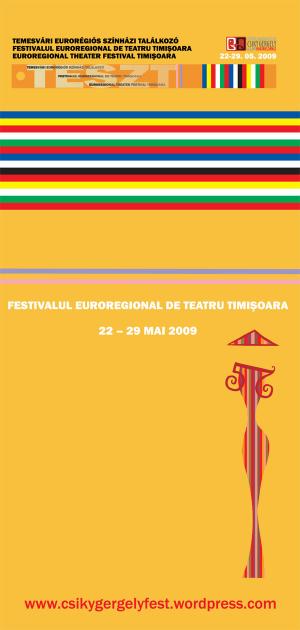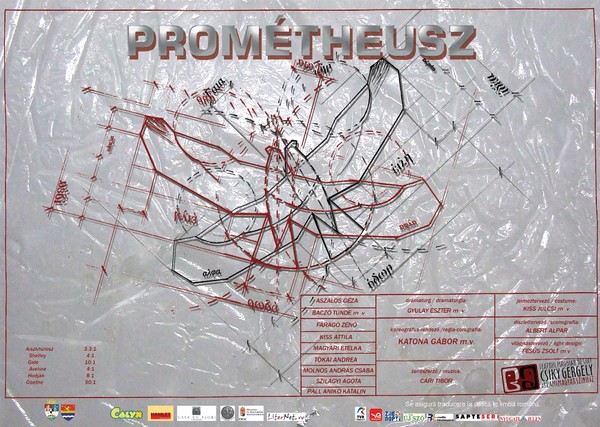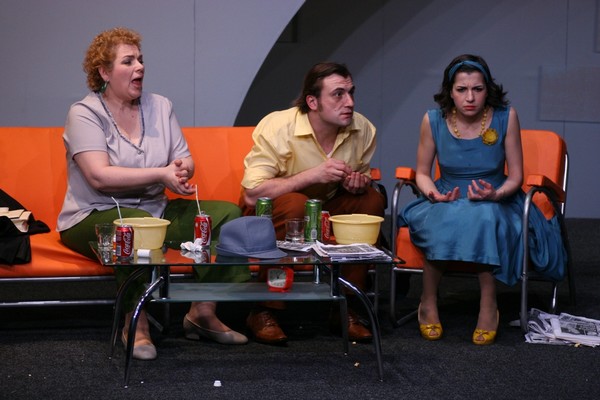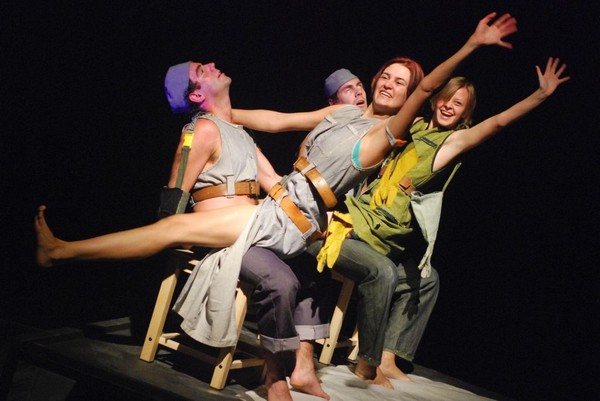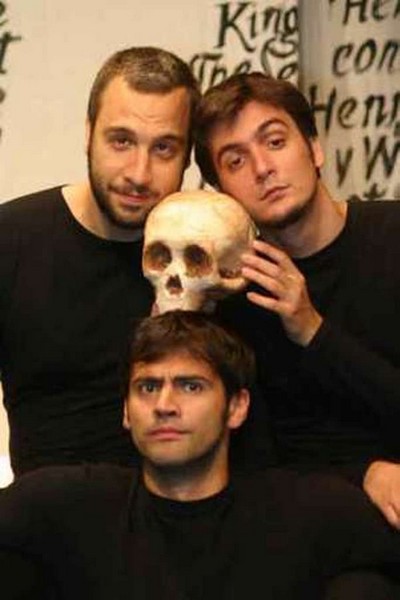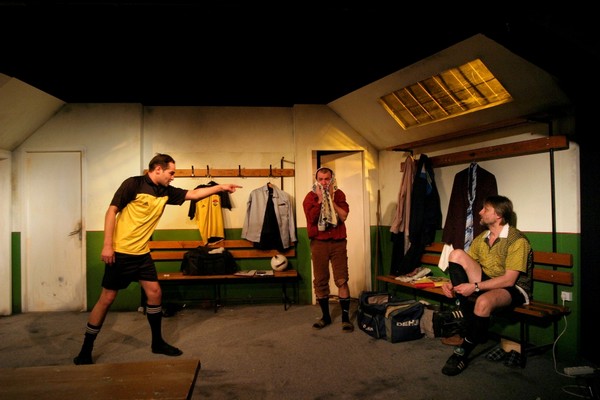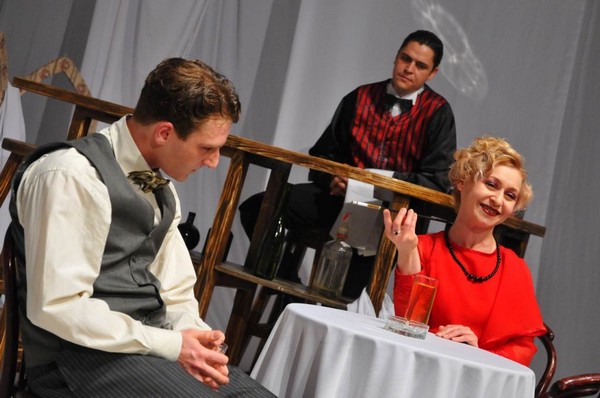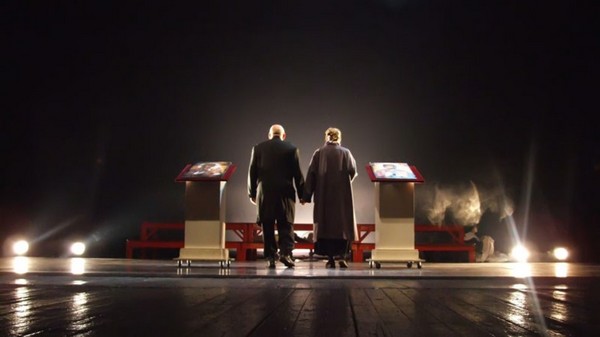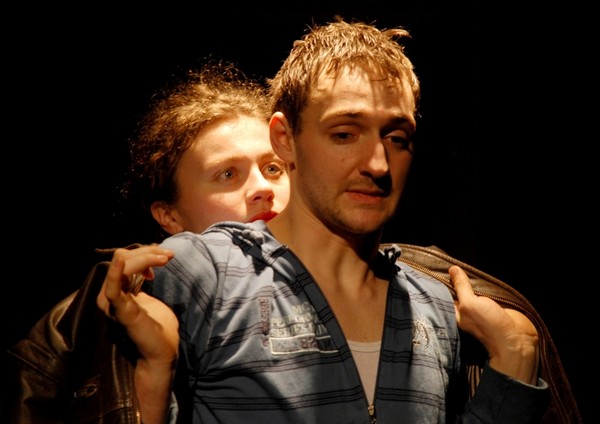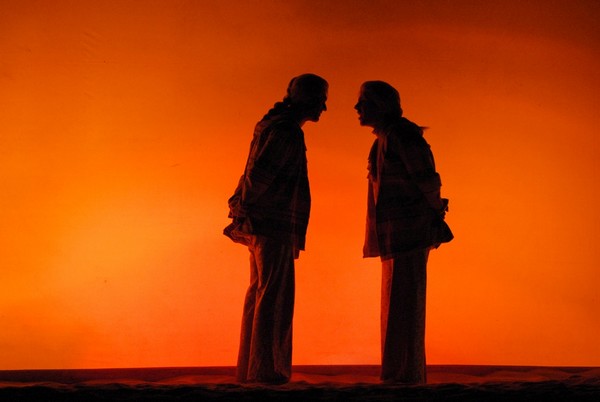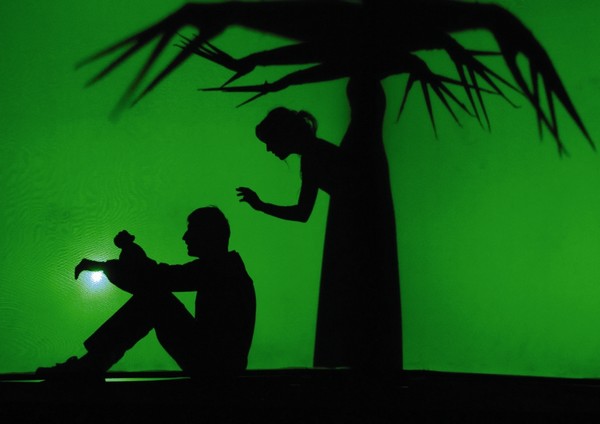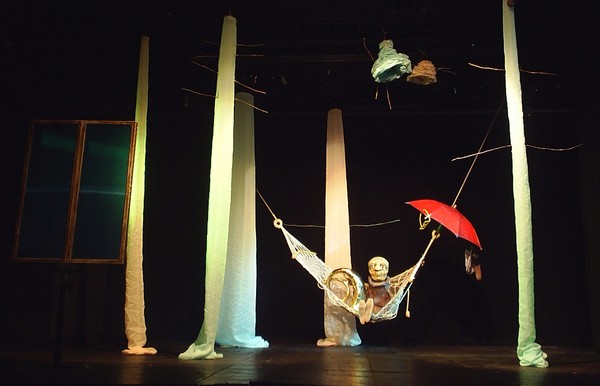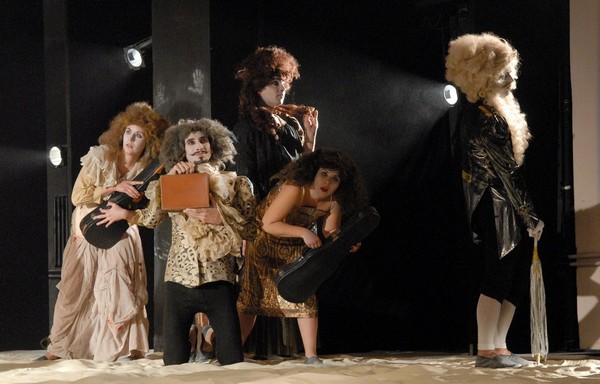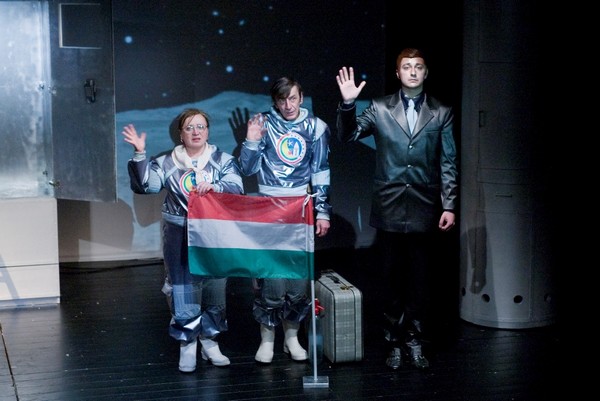Festivalul Euroregional de Teatru Timişoara, 2009
Vineri, 22 mai 2009
ora 18:30, Sala Mare
Deschiderea oficială a Festivalului Euroregional de Teatru Timişoara
ora 19, Sala Mare
Teatrul Maghiar de Stat "Csiky Gergely", Timişoara (RO)
Premieră
Prometeu, R.: Katona Gábor
Sâmbătă, 23 mai 2009
ora 15, Sala Mare
Teatrul German de Stat Timişoara (RO)
Eugène Ionesco: Cântăreaţa cheală, R.: Alexandru Dabija
ora 17, Sala Studio
Teatrul "Kosztolányi Dezső" / Compania Urbán András, Subotica (SRB)
Brecht - The Hardcore Machine, R.: Urbán András
ora 20, Sala Mare
Teatrul Popular Subotica / Trupa Sârbă (SRB)
J. Borgeson, A. Long, D. Singer: Operele complete ale lui Wllm Shkspr (prescurtate), R.: Kokan Mladenović
ora 22, Foaierul teatrului
Concert - cântă actorii Trupei Maghiare a Teatrului Popular din Subotica
Duminică, 24 mai 2009
ora 13, Foaierul teatrului
Discuţie liberă cu reprezentanţii teatrelor din regiune
ora 17, Sala Studio
Teatrul "Jókai" din Judeţul Békés, Békéscsaba (HU)
Egressy Zoltán: Măcriş, cartofi prăjiţi, R.: Koleszár Bazil Péter
ora 19, Sala Mare
Teatrul Popular Subotica / Trupa Maghiară (SRB)
Müller Péter - Seress Rezsõ: Gloomy Sunday, R.: Kovács Frigyes
ora 22, Restaurant Sara
Concert - Antovszki Band, Békéscsaba (HU)
Luni, 25 mai 2009
ora 19, Sala Studio
Teatrul Maghiar de Stat "Csiky Gergely", Timişoara (RO)
Ali Taylor: Cotton wool, R.: Barabás Olga
ora 22, Restaurantul Sara
Concert - Shake Quartett, Timişoara (RO)
Marţi, 26 mai 2009
ora 11, Foaierul teatrului
Modă şi Costum - prezentarea creaţiilor semnate Rozalb de Mura (Oláh Gyárfás) şi Kiss Julcsi
ora 17, Sala Studio
Teatrul din Novi Sad, Novi Sad (SRB)
Domonkos István: Primăvară, R.: Táborosi Margaréta
ora 19:30, Sala Mare
Teatrul Maghiar de Stat "Csiky Gergely", Timişoara (RO)
Prometeu, R.: Katona Gábor
Miercuri, 27 mai 2009
ora 11, Sala Studio
Teatrul Maghiar de Stat "Csiky Gergely", Timişoara (RO)
Hänsel şi Gretel, după Fraţii Grimm, R.: Carmen Mărginean
ora 17, Sala Mare
Teatrul Maghiar de Stat "Csiky Gergely", Timişoara (RO)
Amor omnia, R.: Peter Pashov - Zheni Pashova
ora 20, Sala Mare
Teatrul "Atelie 313", Sofia (BG)
Sfârşit de noiembrie, R.: Rumen Gavanozov
Joi, 28 mai 2009
ora 19, Sala Mare
Teatrul din Novi Sad, Novi Sad (SRB)
J. B. Molière: Mizantropul, R.: Anca Bradu
ora 22, Restaurant Sara
Concert - Muzica teatrului
Vineri, 29 mai 2009
ora 19, Sala Mare
Teatrul "Jászai Mari", Tatabánya (HU)
Tasnádi István: Ungurul pe Lună, R.: Árkosi Árpád
Prezentarea spectacolelor
Csiky Gergely Állami Magyar Színház / Teatrul Maghiar de Stat "Csiky Gergely" / Csiky Gergely Hungarian State Theatre
Prométheusz / Prometeu / Prometheus
Szereplők / Distribuţia / Cast: Aszalos Géza, Baczó Tünde, Faragó Zénó, Kiss Attila, Magyari Etelka, Tokai Andrea, Molnos András Csaba, Szilágyi Ágota, Páll Anikó Katalin
rendező-koreográfus / regizor-coregraf / directed and choreographed by: Katona Gábor
dramaturg / dramaturgia / dramaturg: Gyulay Eszter
zeneszerző / compozitor / composer: Cári Tibor
díszlettervező / decor / set designer: Albert Alpár
jelmeztervező / costume / costume designer: Kiss Julcsi
világítástervező / light designer: Fésüs Zsolt
súgó / sufleur / prompter: Czumbil Marika
ügyelő / regizor tehnic / stage manager: Kertész Éva
Az előadás időtartama / Durata spectacolului / Running time: 1h 10'
Magyar nyelvű előadás, román fordítással / Spectacol în limba maghiară, cu traducere în limba română / Hungarian performance, with Romanian translation
Prométheuszról négy monda ad hírt: Az első szerint odaláncolták a Kaukázus sziklájához, mert az isteneket elárulta az embereknek, és az istenek sasokat küldtek, melyek tépdesték mindig újrasarjadó máját. A második szerint Prométheusz a lecsapó csőrök okozta fájdalmában egyre mélyebben nyomult a sziklába, míg eggyé nem lett vele. A harmadik szerint évezredek során elfelejtették árulását, elfeledték az istenek, a sasok, ő maga...
A negyedik szerint mindenki belefáradt az immár ok nélkülibe. Belefáradtak az istenek, belefáradtak a sasok, fáradtan összezárult a seb. Maradt a megmagyarázhatatlan sziklahegység. A monda a megmagyarázhatatlant próbálja magyarázni. Mivel a valóságra épül, újra megmagyarázhatatlanságban kell végződnie. (Franz Kafka: Prométheusz)
Patru legende vorbesc despre Prometeu: Conform primei legende, a fost înlănţuit pe Caucaz pentru că le-a revelat oamenilor secretele zeilor, iar zeii au trimis vulturi care îi sfâşiau ficatul ce creştea necontenit la loc. După a doua legendă, Prometeu s-a lipit tot mai adânc de stâncă din pricina durerii provocate de ciocurile ce ciuguleau din trupul lui, până ce a devenit una cu ea. Conform celei de-a treia, peste milenii, trădarea lui a fost uitată, zeii au uitat, apoi vulturii şi chiar şi el... După cea de-a patra, lumea a obosit de cel rămas fără cauză. Zeii obosiseră, vulturii obosiseră, până şi rana se închisese obosită. Nu rămăsese decât stânca inexplicabilă. Legenda însă încearcă să explice inexplicabilul. De vreme ce pleacă de la un adevăr, trebuie să sfârşească din nou în inexplicabil. (Franz Kafka: Prometeu)
There are four legends concerning Prometheus. According to the first, he was clamped to a rock in the Caucasus for betraying the secrets of the gods to men, and the gods sent eagles to feed on his liver, which was permanently renewed. According to the second, Prometheus, goaded by the pain of the tearing beaks, pressed himself deeper and deeper into the rock until he became one with it. According to the third, his treachery was forgotten in the course of years, forgotten by gods, the eagles, forgotten by himself. According to the fourth, everyone grew weary of the meaningless affair. The gods grew weary, the eagles grew weary, the wound closed wearily. There remained the inexplicable mass of rock. The legend tried to explain the inexplicable. As it came out of a substratum of truth it had in turn to end in the inexplicable. (Franz Kafka: Prometeu)
Temesvári Állami Német Színház / Teatrul German de Stat Timişoara / German State Theatre Timişoara
Eugène Ionesco
A kopasz énekesnő / Cântăreaţa cheală / The Bald Soprano
Fordította / Traducerea / Translated by: Serge Stauffer
Szereplők / Distribuţia / Cast: Radu Miodrag Vulpe, Ioana Iacob, Rareş Hontzu, Isolde Cobeţ, Olga Török, Boris Gaza
rendező / regia / directed by: Alexandru Dabija
díszlet és jelmez / decorul şi costumele / set and costume design: George Petre
látványtervező asszisztens / asistent scenografie / set and costume designer: Zsolt Fehérvári
ügyelő / regia tehnică / stage manager: Liviu Oltean
Az előadás időtartama / Durata spectacolului / Running time: 1h 10'
Német nyelvű előadás, román és magyar fordítással / Spectacol în limba germană, cu traducere în limbile maghiară şi română / German performance, with Hungarian and Romanian translation
Mr. Smith és Mrs. Smith értelmetlen dolgoról csevegnek, anélkül hogy valójában kommunikáljanak. Megérkezik a Martin házaspár, akik rájönnek, egy ugyanilyen abszurd beszélgetés következtében, hogy össze vannak házasodva. A párbeszéd fokozatosan értelmetlen mondatokkal, szavakkal majd végül hangokkal cserélődik fel. Ionesco ezen munkája, amelyik előtérbe hozza a mindennapi létünk abszurditását, a legjátszottabb színdarab a kortárs színházművészetben.
Domnul şi doamna Smith schimbă vorbe despre lucruri fără relevanţă, fără să reuşească, de fapt să comunice. Sosesc soţii Martin, care constată, în cursul unei discuţii la fel de absurde, că sunt căsătoriţi unul cu celălalt. Treptat, dialogul este înlocuit de propoziţii fără sens, de cuvinte şi în fine de sunete. Această piesă a lui Ionesco, ce aduce în prim-plan absurditatea existenţei noastre cotidiene, este cea mai jucată piesă din teatrul universal contemporan.
Mr. And Mrs. Smith chit-chat about irrelevant things, without really comunicating. The Martins arrive and realize after an absurd discussion, that they are married to one another. The dialogue is gradually replaced by meaningless phrases, words, then finally sounds. Ionesco's play, which brings the absurdity of our everyday existence to the spotlight is the most performed play in contemporary world theatre.
Kosztolányi Dezső Színház / Teatrul "Kosztolányi Dezső" / "Kosztolányi Dezső" Theatre
Urbán András Társulata / Compania Urbán András / Urbán András Troupe
Brecht - The Hardcore Machine
Bertolt Brecht Buckowi elégiái alapján / bazat pe Elegiile Buckowiene ale lui Bertolt Brecht / based on the Buckower Elegies by Bertolt Brecht
Szereplők / Distribuţia / Cast: Mészáros Árpád, Mikes Imre Elek, Erdély Andrea, Béres Márta
rendező / regia / directed by: Urbán András
mozgás / mişcare / choreography: Varga Heni
zene / muzica / music: Mezei Szilárd
jelmez / costume / costume design: Varga Tünde
dramaturg / dramaturgia / dramaturg: Urbán András
műszaki referens / referent tehnic / tehnical rapporteur: Úri Attila
Az előadás időtartama / Durata spectacolului / Running time: 1h
Magyar nyelvű előadás, román fordítással / Spectacol în limba maghiară, cu traducere în limba română / Hungarian performance, with Romanian translation
Az előadás nem színdarab. A posztdramatikus színház az irodalmi dráma következménye. A Brecht - The Hardcore Machine arról szól, hogy egy fiatal munkáslány, mielőtt kilakkozná a körmeit, felemel egy odavetett munkáskesztyűt és ekkor belép az ideológia és a testiség csodálatos világába. Az előadás próbafolyamata során a színész csak testként létezik. A test cselekszik. A cselekvés akció. A fizikai akció drámai, történeti tartalmakat jelenít meg. Itt lép színre a drámai színész, aki végrehajt, játszik. Munka. Éhínység. Szex. Hatalom. Szórakozás.
Spectacolul nu este o piesă. Teatrul postdramatic este consecinţa dramei literare. Spectacolul Brecht - The Hardcore Machine vorbeşte despre o fată, care înainte de a-şi da unghiile cu lac, ridică o mănuşă ce aparţine unui muncitor, şi în acel moment păşeşte în lumea fascinantă a ideologiei şi a carnalităţii. În timpul perioadei de repetiţie actorul există doar ca şi corp. Corpul se mişcă. Mişcarea este acţiune. Acţiunea fizică evocă cuprinsuri dramatice şi istorice. Aici intră în scenă actorul dramatic, care execută, joacă. Muncă. Foamete. Sex. Putere. Distracţie.
The performance is not a play. The postdramatic theatre is a consequence of the literary drama. The Brecht - The Hardcore Machine is a story about a young girl who, before painting her nails, picks up a worker-glove, and in that moment she steps into the fascinating world of ideology and carnality. During the rehearsal period the actor exists only as a body. The body moves. Movement is action. Physical action evokes dramatic, historical contents. This is when the dramatical actor comes on stage, executes, performs. Work. Starvation. Sex. Power. Entertainment.
Szabadkai Népszínház / Teatrul Popular din Subotica / Folk Theatre of Subotica
Szerb Társulat / Trupa Sârbă / Serbian Troupe
J. Borgeson, A. Long, D. Singer
SÖR (Shakespeare Összes Röviden) / Operele complete ale lui Wllm Shkspr (prescurtate) / The Complete Works of Wllm Shkspr (abridged)
Szereplők / Distribuţia / Cast: Miloš Stanković, Igor Pavlović, Vladimir Grbić
rendező / regia / directed by: Kokan Mladenović
díszlettervező / decor / set designer: Ištvan Hupko
jelmeztervező / costume / costume designer: Marina Sremac
Az előadás időtartama / Durata spectacolului / Running time: 2h
Szerb nyelvű előadás, magyar és román fordítással / Spectacol în limba sârbă, cu traducere în limbile maghiară şi română / Hungarian performance, with Hungarian and Romanian translation
A SÖR (Shakespeare Összes Röviden) című előadás egy fergeteges komédia, melyben egybeforr a híres drámaíró összes történelmi drámája, tragédiája és vígjátéka. Londoni, 1987-es bemutatója után, a szöveg világsikerré vált. A Szerbiában levő Szabadkai Népszínház közönsége számtalanszor végignézte már a produkciót.
Operele complete ale lui Wllm Shkspr (prescurtate) este un spectacol care îngemănează într-o comedie spumoasă toate dramele istorice, tragediile şi comediile renumitului autor. După prima punere în scenă, la Londra, în anul 1987, acest text a devenit un "succes mondial".
The Complete Works Of Wllm Shkspr (abridged) is a play which blends all the histories, tragedies and comedies of the famous playwright to form one great comedy. After it's first mise en scène in London 1987, the text has become a "worldwide success".
Békés Megyei Jókai Színház / Teatrul "Jókai" din Judeţul Békés / "Jókai" Theatre of Békés County
Egressy Zoltán
Sóska, sültkrumpli / Măcriş, cartofi prăjiţi / Sorrel, French Fries
Szereplők / Distribuţia / Cast: Gulyás Attila, Bartus Gyula, Csomós Lajos
rendező / regia / directed by: Koleszár Bazil Péter
díszlettervező / decor / set designer: Fekete Péter
jelmeztervező / costume / costume designer: Junion
Az előadás időtartama / Durata spectacolului / Running time: 1h 20'
Magyar nyelvű előadás, román fordítással / Spectacol în limba maghiară, cu traducere în limba română / Hungarian performance, with Romanian translation
Férjek, komák, ivócimborák, focibarátok, felnőtt férfiak! Évek óta ígéritek feleségeteknek, barátnőtöknek, szeretőtöknek hogy majd elviszitek Színházba? Eljött az idő! De ha már színházba kell menni, miért ne érezhetnétek jól magatokat? Garantált szórakozást ígér Egressy Zoltán Sóska, sültkrumpli című színdarabja, minden focirajongó számára. Az öltözőbe zárva egy bíró és két partjelző marakodik, míg kint várja őket a szurkolóhad. Ha szeretnétek tudni, mi történik a meccs előtt - alatt - után az öltözőben, nézzétek meg Egressy Zoltán kitűnő színdarabját a Békés Megyei Jókai Színház előadásában. Sóska, sültkrumpli - mert labda is gömbölyű, de a világ sem mindig kerek!
Soţi, cumetri, tovarăşi de pahar, fani ai fotbalului, bărbaţi maturi! Promiteţi de ani întregi soţiei, prietenei, iubitei că o veţi însoţi la teatru? A venit vremea! Dar dacă tot sunteţi obligaţi să vă deplasaţi, de ce să nu vă şi simţiţi bine? Piesa Măcriş, cartofi prăjiţi de Egressy Zoltán promite distracţie garantată tuturor fanilor de fotbal. Închişi în cabină, un arbitru şi doi tuşieri se iau la harţă, în timp ce afară îi aşteaptă oceanul de suporteri. Dacă sunteţi curioşi ce se întâmplă în cabină înainte - în timpul şi după meci, vizionaţi excelenta piesă a lui Egressy Zoltán, în montarea Teatrului "Jókai" din Judeţul Békés. Măcriş, cartofi prăjiţi - pentru că mingea e rotundă, dar parcă lumea nu e întotdeauna aşa!
Husbands, godfathers, drinking chums, football fans, mature men! Have you been promising your wife, girlfriend, lover for years, that you'll take her to the theatre? The time has come! But if you're forced to go anyway, why not enjoy yourselves? The play Sorrel, French Fries written by Egressy Zoltán promises guaranteed fun for every football fan. Locked in the dressing-room, a referee and two linesman are arguing, while a sea of fans are waiting for them outside. If you're curious what is going on in the cabin before - during - after the match, come see the excellent play by Egressy Zoltán, presented by the "Jókai" Theatre of Békés County. Sorrel, French Fries. Because the ball is round too, but not even the world is always circular!
Szabadkai Népszínház Magyar Társulat / Teatrul Popular din Subotica Trupa Maghiară / Folk Theatre of Subotica, Hungarian Troupe
Müller Péter - Seress Rezső
Szomorú Vasárnap / Duminici mohorâte / Gloomy Sunday
Szereplők / Distribuţia / Cast: Pálfi Ervin, Erdélyi Hermina, Szőke Attila
rendező / regia / directed by: Kovács Frigyes
korrepetítor és zenei munkatárs / corepetitor şi colaborator muzical / chorus and musical collaborator: ifj. Kucsera Géza jr.
hegedűn közreműködik / acompaniament la vioară / violin accompaniment: Lajkó Félix
brácsán közreműködik / acompaniament la violă / viola accompaniment: Brasnyó Antal
díszletterv / decor / set design: Szilágyi Nándor
jelmezterv / costume / costume design: Kreszánkó Viktória
dramaturg / dramaturgia / dramaturg: Brestyánszki B. R., Vinkó József
koreográfus / coregraf / choreography: Rogács László
rendezőasszisztens / asistent regie / director's assistant: Kocsis Valéria
"Csak átutazó vagyok..." című dal szövegírója / libretistul cântecului "Csak átutazó vagyok..." / the lyricist of the song "Csak átutazó vagyok...": Horváth Jenő
súgó-ügyelő / sufleur-regizor tehnic / prompter-stage manager: Vrestyák Erzsébet
fénymester / lumini / lights: Flajsman Róbert
hangmester / sunet / sound: Piukovity Norbert
Az előadás időtartama / Durata spectacolului / Running time: 2h 15'
Magyar nyelvű előadás, román fordítással / Spectacol în limba maghiară, cu traducere în limba română / Hungarian performance, with Romanian translation
A mű tökéletes tükre a vajdasági ember melankóliájának. A kis Seress, az apró termetű "füttyös muzsikus" dalait világszerte játszották. A Szomorú vasárnapot, az "öngyilkosok himnuszát", több, mint negyven nyelvre lefordították. Számtalan legenda született Seress életéről és haláláról, azt tartják róla, hogy talán minden idők legszomorúbb világhíressége, holott egy cseppet sem volt bánatos ember, sőt, egész nyomorúságos életét átbohóckodta a Kispipa étterem pianínója mögött. Müller Péter zenés kamaradarabjában Seress Rezső - slágereivel megtűzdelve - halála után tekint vissza életére, amelyet feleségével, Helénnel és a kiskocsma hűséges pincérével, Janival együtt mesél el közönségének.
Piesa este oglinda perfectă a melancoliei omului din Vojvodina. Melodiile micuţului Seress, "muzicantul ce fluieră" de statură mică, au fost cântate în toată lumea. Melodia Gloomy Sunday, "imnul sinucigaşilor", a fost tradusă în mai mult de patruzeci de limbi. S-au născut nenumărate legende în legătură cu viaţa şi moartea lui Seress; se spune despre el, cum că ar fi cea mai tristă vedetă a tuturor timpurilor, deşi n-a fost deloc un om duios, dimpotrivă, şi-a bufonat întreaga sa existenţă mizerabilă în spatele pianinului din restaurantul Kispipa. În piesa muzicală de cameră a lui Müller Péter înţesată cu şlagărele lui Seress Rezső, acesta priveşte înapoi după moarte asupra vieţii sale, pe care o povesteşte publicului împreună cu soţia sa, Helén şi Jani, chelnerul loial al birtului.
The play is the perfect mirror of the melancholy of the man from Vojvodina. The tunes of the small Seress, the tiny statured "whistling musician", were played throughout the whole world. The song Gloomy Sunday, the "anthem of the suicidals", was translated into more than forty languages. Countless legends were born about the life and death of Seress; it is said that he is the saddest world celebrity of all times, although he has never been a sorrowful person, on the contrary, he clowned his way through his whole miserable existence, sitting behind the upright piano in the Kispipa restaurant. In this musical chamber play written by Müller Péter, Seress Rezső Péter - stuffed with Seress Rezső's musical hits -, the artist looks back, after his death, upon his life, which is told to the public together with his wife Helén, and Jani, the pub's loyal waiter.
Aradi Ioan Slavici Klasszikus Színház / Teatrul Clasic "Ioan Slavici" Arad / "Ioan Slavici" Clasical Theatre Arad
Dekalog / Decalog / Decalogue
Szereplők / Distribuţia / Cast: Ovidiu Ghiniţă, Adriana Ghiniţă, Liliana Balica, Zoltán Lovas, Angela Petrean, Oltea Blaga, Bogdan Costea, Andrei Elek, Levente Kocsárdi, Etelka Magyari, Marian Parfeni, Alina Danciu, Cecilia Donat, Tudor Lucanu, Mariana Tofan Arcereanu, Ionel Bulbuc
rendező / regia / directed by: Laurian Oniga
díszlet / decor / set design: Laurian Popa
jelmez / costume / costume design: Oana Văran
Az előadás időtartama / Durata spectacolului / Running time: 1h 15'
A szteppből és pantomimből álló Dekalog című előadás Laurian Oniga nevét viseli úgy a rendezést illetően, mint a forgatókönyv megalkotását. Milyen kapcsolat áll fenn a választási kampány és a színházi előadás között? A nonverbális produkció a jelen időszak nagy problémáit és kérdéseit feszegeti: mi mindent vagyunk hajlandóak áthágni a hatalomért, milyen kompromisszumokat vagyunk képesek kötni a hatalom elérése érdekében, kit mellőzünk (szándékosan vagy sem) ebben az éles küzdelemben, hol maradnak azok az erkölcsök, melyek életünket kellene vezessék? Az előadás újszerűsége abban áll, hogy nem kíván válaszolni ezekre a kérdésekre - és sok másikra, melyek a hatalomért folyó küzdelemben felmerülnek -, hanem csak felmutatja őket. A Dekalog ban használt színpadi nyelvezet pedig képes átlépni bármilyen nyelvi korlátot, hisz univerzálisan érvényes kifejezőeszközöket használ.
Decalog, un spectacol de teatru, step şi pantomimă, poartă semnătura regizorului Laurian Oniga, cel care a conceput şi scenariul. Care este legătura între campania electorală şi spectacolul de teatru? Spectacolul de teatru non-verbal atinge câteva dintre marile probleme şi întrebări ale acestor vremuri: ce suntem dispuşi să încălcăm de dragul puterii, la ce compromisuri suntem în stare să ajungem doar pentru a accede la putere, pe cine ignorăm (voit sau nu) în această luptă acerbă, unde rămân perceptele morale care ar trebui să ne conducă în viaţă? Ineditul acestui spectacol constă şi în faptul că nu îşi propune să răspundă la aceste întrebări - şi la multe altele desprinse din contextul luptei pentru putere - ci doar să le afişeze. Iar limbajul folosit în Decalog este unul capabil să treacă orice barieră lingvistică, utilizând mijloace de expresie universal valabile.
Decalogue, a step and pantomime theatre production, bears the signature of stage director Laurian Oniga, who also created the script. What is the connection between the election campaign and the theatre performance? The nonverbal play tackles some of the important problems and questions of the present period: what are we capable to infringe for the sake of power, what compromises are we willing to make to reach power, who do we ignore (willingly or not) in this acute battle, where do we leave all the morals which should lead our lives? The novelty of the play consists in the fact that it doesn't wish to answer these questions - and others which arise from the context of the battle for power - but only to post them. The language used in Decalogue is capable of crossing any linguistic boundaries, using means of expression universally valid.
Csiky Gergely Állami Magyar Színház / Teatrul Maghiar de Stat "Csiky Gergely" / "Csiky Gergely" Hungarian State Theatre
Ali Taylor
Puha pihe / Cotton Wool
Fordította / Traducerea / Translated by: Upor László
Szereplők / Distribuţia / Cast: Faragó Zénó, Gecse Ákos, Szűcs Noémi
Az előadás időtartama / Durata spectacolului / Running time: 1h 26'
Magyar nyelvű előadás, román fordítással / Spectacol în limba maghiară, cu traducere în limba română / Hungarian performance, with Romanian translation
rendező / regia / directed by: Barabás Olga
a rendező munkatársa / asistent regie / director's assistant: Sőregi Melinda
mozgásművészeti tanácsadó / consultant mişcare scenică / stage movement consultant: Blaskó Borbála
zeneszerző / compozitor / music composer: Apostolache Zénó
díszlet- és jelmeztervező / scenografia / set and costume designer: Barabás Olga
ügyelő / regizor tehnic / stage manager: Kertész Éva
súgó / sufleur / prompter: Czumbil Marika
világosító / lumini / lights: Ilyés Anna, Bálint Andor, Szilak Károly
hangosító / sonorizare / sound: Bikfalvi József, Erdődi Endre
Két tizenéves fiatal a felnőtté válás szélén a hideg és szeles Skóciában poénokkal próbálják elnyomni fájdalmukat, hiszen édesanyjuk halála után most már egyedül kell boldogulniuk. Mit választanak vajon? Együtt maradnak? Vagy külön utakat járnak? A temetés utáni néhány nap alatt megfordul körülöttük a világ, és életükben először a szerelemmel is találkoznak.
Aflaţi în pragul vieţii de adult, doi adolescenţi din Scoţia cea rece încearcă să alunge, cu puterea glumelor, durerea stârnită de moartea mamei lor. De acum, trebuie să se descurce singuri. Ce vor alege oare? Vor rămâne împreună? Sau o va apuca fiecare pe calea sa? La câteva zile după înmormântare, lumea lor se întoarce cu susul în jos, dar pentru prima oară în viaţă întâlnesc şi iubirea.
On the edge of entering maturity, two teenagers from the cold Scotland try to banish the pain caused by their mother's death by means of humour. From now on, they should manage on their own. What will they choose? Will they stay together? Will they take separate ways? Few days after the funeral their world is turned upside down, but for the first time in their lives, they encounter love.
Újvidéki Színház / Teatrul din Novi Sad / Theatre of Novi Sad
Domonkos István
Tavasz / Primăvară / Spring
Szereplők / Distribuţia / Cast: Crnkovity Gabriella, Elor Emina, Kokrehel Júlia, Raffai Ágnes, Buza Ákos, Gombos Dániel, Mészáros Gábor, Soltis Lehel
rendező / regia / directed by: Táborosi Margaréta
zeneszerző / compozitor / composer: Szőke Szabolcs
néptánc / dansuri populare / folk dances: Kiss Zselykó
videó / proiecţie video / projection: Varga Tamás
fény / lumini / lights: Szöllősi László és Majoros Róbert
Az előadás időtartama / Durata spectacolului / Running time: 2h
Magyar nyelvű előadás, román fordítással / Spectacol în limba maghiară, cu traducere în limba română / Hungarian performance, with Romanian translation
Egy előadás azoknak, akiknek a hátukon kidudorodik pár csigolya a sok munkától; akik néha nem tudják, hogy mit kell mondaniuk; akik megfenyegetik a csillagokat: lennétek csak közelebb...!; akik legszívesebben az utcán aludnának, mert tudják, hogy az embert mindig olyankor éri a halál, amikor egyedül van; akik nem tudják, hogy hol vesztették el önmagukat; akik úgy érzik, néha kevés kell ahhoz, hogy megbolonduljanak; akik nem birják az olyan igazságot, ami annyira igaz, hogy már taszít; akik úgy érzik, a szavaik nem fejezik ki azt, amit mondani szeretnének; akik szaladnának,de nincsen hova... Nevetve gondolkodtató, fekete-fehér előadás Vajdaságról.
Un spectacol pentru cei care se gârbovesc de la atâta muncă, cei care uneori nu ştiu ce ar trebui să spună, cei care ameninţă stelele: "dac-aţi fi mai aproape...!"; cei care ar dormi pe stradă cu cea mai mare plăcere, deoarece sunt conştieţi de faptul că moartea ne ajunge întotdeauna atunci, când suntem singuri, cei care nu ştiu, unde s-au pierdut pe ei înşişi, cei care simt că uneori ar mai fi puţin şi ar înnebuni, cei care nu suportă adevărul, care e atât de adevărat, încât e respingător; cei care simt că vorbele nu exprimă ceea ce ar dori să spună; cei care ar fugi, dar n-au unde... Un spectacol alb-negru despre Voivodina, care te pune pe gânduri, râzând.
A performance for those who stoop from all the work, those who sometimes don't know what they should say, those who threaten the stars: "if only you were closer...!"; those who would rather sleep on the street, knowing that death always comes when you're alone; those who don't know where they've lost themselves, those who feel they're one step away from going insane, those who can't bear the truth, which is so true that it's repulsive, those who feel that words don't express what they would like to say, those who would run away, but there's nowhere to go... A black and white show about Voivodina, which gets you thinking while laughing.
Csiky Gergely Állami Magyar Színház / Teatrul Maghiar de Stat "Csiky Gergely" / "Csiky Gergely" Hungarian State Theatre
Jancsi és Juliska / Hänsel şi Gretel / Hansel and Gretel
A Grimm testvérek meséje alapján / după fraţii Grimm / based on the Grimm brothers' fairy tale
Szereplők / Distribuţia / Cast: Vass Richárd, Tankó Erika, Páll Anikó Katalin, Nagy Sándor, Tar Mónika, Bonczidai Dezső
rendező / regia / directed by: Carmen Mărginean
díszlet, jelmez és a marionettek / decor, costume şi marionete / set, costume and marionette design: Nelu Pitic
zene / muzica / music: Cári Tibor
hangosító / sonorizare / sound: Erdődi Endre, Bikfalvi József
világosító / lumini / lights: Illyés Anna, Bálint Andor, Szilak Károly
ügyelő / regizor tehnic / stage manager: Szilágyi Olga
Az előadás időtartama / Durata spectacolului / Running time: 50'
Magyar nyelvű előadás, román fordítással / Spectacol în limba maghiară, cu traducere în limba română / Hungarian performance, with Romanian translation
Két éhező gyermek, egy csodálatos mézeskalács házikó és egy igen rossz vasorrú bába klasszikus meséje - marionettekkel.
Clasica poveste - cu marionete - a doi copii înfometaţi, o căsuţă magică de turtă dulce şi o vrăjitoare foarte rea.
The classic tale - with marionettes - of two very hungry children, a fantastic gingerbread house, and a very nasty witch.
Csiky Gergely Állami Magyar Színház / Teatrul Maghiar de Stat "Csiky Gergely" / "Csiky Gergely" Hungarian State Theatre
Amor omnia
Szereplők / Distribuţia / Cast: Kiss Attila, Kocsárdi Levente, László Pecka Péter, Lőrincz Rita, Magyari Etelka, Molnár Róbert, Molnos András Csaba, Nagy Sándor, Páll Anikó Katalin, Szilágyi Ágota, Tankó Erika, Tar Mónika, Vass Richárd
rendező / regia / directed by: Peter Pashov & Zheni Pashova (BG)
scenariul / script: Peter Pashov & Zheni Pashova (BG)
zeneszerző / compozitor / composer: Cári Tibor
jelmeztervező / costume / costume designer: Albert Alpár
ügyelő / regizor tehnic / stage manager: Deák Irén
világosító / lumini / lights: Ilyés Anna, Szilak Károly, Bálint Andor
hangosító / sonorizare / sound: Bikfalvi József, Erdődi Endre
Az előadás időtartama / Durata spectacolului / Running time: 1h 30'
Az Amor omnia két nemzetközi szinten is elismert bolgár rendező, Peter Pashov és Zheni Pashova csodálatos víziója, mely az örök témának, a szerelemnek a különböző formáit jeleníti meg egy árnyjátékokban és mozgásban gazdag, etűdszerűen építkező előadásban. A rendezők által "vizuális, szegény színháznak" nevezett stílus jegyében készült produkció improvizációkon alapuló próbafolyamat során jött létre a társulat fiatal színészeivel. Az előadás egy igazi csapatmunka eredménye, melyben a különböző eszközök és formanyelvek arányosan lettek kikeverve azzal az érzelmi és érzéki gazdagsággal, amely a szerelemre, a férfi és nő közötti változatos kapcsolatokra jellemző.
Spectacolul este viziunea fermecătoare a perechii regizorale de origine bulgară Peter Pashov şi Zheni Pashova, în care tema perpetuă a iubirii apare în diferite ipostaze, alcătuind un spectacol nonverbal, bogat în jocuri de umbre şi mişcare, structurat asemenea unui studiu muzical. Producţia, care potrivit perechii regizorale, stă sub semnul unui "teatru vizual, sărac", a luat fiinţă în urma repetiţiilor bazate pe improvizaţii, având ca protagonişti pe actorii tineri ai teatrului. Amor omnia este rezultatul unei veritabile munci în echipă, fiind combinaţia armonioasă a diferitelor mijloace şi limbaje stilistice, îmbinate cu acea bogăţie sentimentală şi senzuală, care defineşte iubirea şi relaţiile diferite între femei şi bărbaţi.
Amor omnia is the charming vision of the Bulgarians Peter Pashov and Zheni Pashova, in which the perpetual theme of love appears in different forms, creating a non-verbal performance structured as a musical study, and dominated by shadow play and motion. The performance that, according to the directors, exists under the sign of "visual, poor theatre" came to life based on improvisational rehearsal, starring the young actors of the theatre. The play is the result of true teamwork, where the various tools and stylistic languages are combined harmoniously with the sentimental and sensual profusion that defines various relationships between a man and a woman.
Atelie 313 Színház / Teatrul "Atelie 313" / Theatre "Atelie 313"
Tuve Janson
November vége / Sfârşit de noiembrie / The End of November
Szereplő / Cu / With: Rumen Gavanozov
az előadás alkotói / un spectacol de / a performance by Rumen Gavanozov & Stanislava Krasteva
látványterv / scenografia / scene: Stanislava Krasteva
Az előadás időtartama / Durata spectacolului / Running time: 1h
Angol nyelvű előadás, román és magyar fordítással / Spectacol în limba engleză, cu traducere în limbile maghiară şi română / English performance, with Hungarian and Romanian translation
Fennebb, fennebb és messze földön... Az útról szóló történet. Mindenki aki megszületik, rálép az útra. Időnk javarészt tudattalanul utazunk, de az út így is úgy is folytatódik. Ám azokban a ritka pillanatokban, mikor tudatunk felébred, megértjük, hogy a lényeg nem az út vége, hanem az, hogy miképp utazunk el addig. Minden ami történik a mi hősünkkel, elkerülhetetlen, visszafordíthatatlan és sürgös. Nagyon gyakran egy jövőbeli kép lebeg előttünk, vagy belefeledkezünk múltbeli emlékekbe és "elhalasztjuk" a jelenünket. Az Öregember (ahogy ő saját magát nevezi) számára ez lehetetlen. Neki nincs múltja (pedig százéves), mert majdnem mindent elfelejtett már. Újra fel kell fedeznie a környező tárgyak célját. Nem minden méltó az emlékezésre, de bizonyos dolgok fontosak számára - "Ez egy juharfa. Nem fogom elfelejteni."
Ez a reménytelen feledés valójában egy jó búcsú mindentől. Elfeledve múltadat lehetőséged nyílik szabadon álmodni és rájönni hogy a jelen pillanat a legfontosabb. Új név, új barátok, új utazási vágy... "Száz öreg év után kinyitom az ernyőmet és becsukom magam mögött az ajtót." És merre tart? Az út jobban tudja. Immár nyugodt, akár egy járó fa, melynek levelei nem lengenek. És lassan eltűnik ebben az erdőben, annyi kilométernyi csenddel maga előtt. És a kör bezárul.. - "..mert az idő repül és eloltódik az éjben." (John Lennon)
Mai sus, mai sus şi departe... Sfârşit de noiembrie e o poveste despre drum. Toată lumea care se naşte păşeşte pe un drum. Majoritatea timpului călătorim inconştient, dar, oricum, drumul merge mai departe. Însă în acele clipe rare, când simţim raţiunea, înţelegem faptul că esenţa nu constă în a ajunge la capătul drumului, ci în modul în care ajungem acolo. Tot ceea ce i se întâmplă eroului nostru este inevitabil, ireversibil şi urgent. Foarte des trăim cu o idee legată de viitorul nostru, sau cu amintirile din trecut, şi ne "amânăm" prezentul... Pentru Bătrânel (cum îşi zice el însuşi) acest lucru este imposibil. El nu are trecut (cu toate că are o sută de ani) pentru că a uitat aproape totul. Trebuie să găsească din nou rostul obiectelor din jur. Nu totul e demn de amintit, dar unele lucruri îi sunt importante - "Acesta este un arţar. Nu-l voi uita."
Această uitare iremediabilă este, de fapt, un rămas bun de la tot. Uitându-ţi trecutul ai posibilitatea să visezi în libertate şi să realizezi că prezentul este cel mai important. Un nou nume, prieteni noi, o nouă dorinţă de a călători... "După o sută de ani îmi voi deschide umbrela şi voi închide uşa după mine." Şi încotro se îndreaptă? Drumul ştie mai bine. Acum e calm asemenea unui copac rătăcitor, ale cărui frunze nu flutură. Şi dispare încet în această pădure cu atâţia kilometri de linişte în faţa lui. Şi cercul se închide.. - "...pentru că timpul zboară şi se stinge în noapte." (John Lennon)
Higher, higher and far away... This is a story about the road. Everyone being born takes the road. Most of the time we travel unconsciously, but anyway the road goes on. But in the rare moments when one can feel the sense, one comprehends that the point is not the end of the road, but how we travel to this end. Everything that happens to our hero is inevitable, irreversible and urgent. Very often we live with an idea for our future, or with the memories of our past and we "postpone" our present... For the Old man (as he calles himself) this is impossible. He has no past (although he is hundred years old) because he has forgotten almost everything. He has to find again the purpose of the objects around him. Not all is worth remembering, but some things are important for him - " This is a maple. I'll not forget it."
This hopeless oblivion is, in fact, a good farewell to everything. By forgetting your past you can find a possibility to dream in freedom and to realize the present moment as being the most important. New name, new friends, new wish to travel... "After one hundred old years I'll open my umbrella and close the door behind me." And where is he going to? The road knows better. Now he is calm as a walking tree, whose leaves aren't waving. And he slowly disappears in this forest with so many kilometers of silence in front of him. And the circle closes... - "...because time flies and turns off in the night." (John Lennon)
Újvidéki Színház / Teatrul din Novi Sad / Theatre of Novi Sad
Molière
A mizantróp / Mizantropul / The Misanthrope
Szereplők / Distribuţia / Cast: Balázs Áron, Varga Tamás, Kőrösi István, László Sándor, Elor Emina, Ferenc Ágota, Jankovics Andrea, Magyar Attila, Sirmer Zoltán, Huszta Dániel, Pongó Gábor, Molnár Róbert, Faragó Edit, Jaskov Melinda, Táborosi Margaréta, Kokrehel Júlia, / Crnkovity Gabriella,, Raffai Ágnes,, Buza Ákos,, Soltis Lehel,
rendező / regia / directed by: Anca Bradu
díszlet- és jelmeztervező / scenografia / set and costume design: Florica Mălureanu
zeneszerző / compozitor / composer: Zoran Simjanović
a rendező munkatársa / asistent regie / director's assistant: Góli Kornélia
sminkmester / machiaj / make-up artist: Szabó Margit
fénymester / lumini / lights: Szöllősi László - Majoros Róbert
hangmester / sonorizare / sound effects: Bíró Tibor
ügyelő / regizor tehnic / stage manager: Lovas Csilla
súgó / sufleur / prompter: Rakić Anna
fotó / foto / photos: Mikus Csaba
Az előadás időtartama / Durata spectacolului / Running time: 2h
Magyar nyelvű előadás, román fordítással / Spectacol în limba maghiară, cu traducere în limba română / Hungarian performance, with Romanian translation
Ki a mizantróp, vagy ki a Mizantróp manapság? Ki ez a hírhedt moliéri hős, aki az ideálok megszállottjaként elutasítja a szerelmet, a barátságot, a társasági életet? Lehet, hogy manapság célszerűbb azt kérdezni, ki maradt meg filantrópnak (emberbarátnak)? Nincs egyértelmű válasz, mert a nagy Molière komédiának titulált művében komoly filozófiai érzékkel nyúlt ahhoz a témához, ami négyszáz év után is időszerű. Minden szélsőség megosztja az embereket, de ami az igazsághoz közeli - vagyis a valós -, az mindig a két véglet között található.
Cine e mizantropul, sau cine e Mizantropul în ziua de azi? Cine e acest erou defăimat al lui Molière, care, obsedat de idealuri respinge iubirea, prietenia şi viaţa socială. Poate că în zilele noastre este mai indicat să ne întrebăm, cine a rămas filantrop? Nu există un răspuns clar, pentru că în opera sa, numită comedie, marele Molière abordează tema veşnic actuală cu un simţ filozofic profund. Extremele divid oamenii, dar ceea ce se află aproape de adevăr - adică realul - se situează între cele două extreme.
Who is the misanthrope, or who is the Misanthrope today? Who is this notorious hero of Molière, whose obsession for ideals makes him reject love, friendship and social life. Maybe nowadays it's more practical to ask ourselves who has remained a philanthropist? There isn't a definite answer, as in his work, referred as comedy, the great Molière has a serious philosophical aproach to the subject, which is current even after 400 years. All the extremities divide people, but what is close to the truth - all that's real - is located between the two extremes.
Jászai Mari Színház / Teatrul "Jászai Mari" / "Jászai Mari" Theatre
Tasnádi István
Magyar a Holdon / Ungurul pe Lună / Hungarian on the Moon
Szereposztás / Distribuţie / Cast: Mucsi Zoltán, Csákányi Eszter Scherer Péter, Katona László
rendező / regia / directed by: Árkosi Árpád
zene / muzica / music - Árkosi Szabolcs
jelmez / costume / costume design - Nagy Fruzsina
dramaturg / dramaturgia / dramaturg - Gyulay Eszter
látvány / decor / set design - Nagy Fruzsina és Juhász András
Külön köszönet / Mulţumiri lui / Special thanks to: Monori Andrásnak
Az előadás időtartama / Durata spectacolului / Running time: 1h 30'
Magyar nyelvű előadás, román fordítással / Spectacol în limba maghiară, cu traducere în limba română / Hungarian performance, with Romanian translation
"Tűnjünk el mielőbb a pusztulásra ítélt Földről, és gyarmatosítsuk a Világegyetemet!" (Stephen Hawking)
Az ENSZ felparcellázta a Holdat, és a telkeket területarányosan elosztotta a Föld országai között. A holdosztás közjegyző előtt, sorsolás alapján dőlt el: Magyarország közvetlen telekszomszédjai Jemen, Szudán, Kelet-Timor, Tonga, Mikronézia, Szlovákia és Románia. A kormány megkezdi az Űr Kolombuszainak kiképzését. A cél: egy Új Világ meghódítása, a magyar holdlakópark létrehozása. Holdtelepesek kerestetnek!
"Érző emberi lények, apák és anyák, az űr kolumbuszai, akik szülőbolygójukat elhagyva arra vállalkoznak, hogy a végtelen kozmoszban egy új, boldog hazát találjanak a magyar népnek! Legyél te is köztük! zoltán, péter, lászló és eszter - és talán te is! Várnak maguk közé: a paradicsom telepesei!"
"Să dispărem cât mai repede de pe acest Pământ sortit pieririi, şi să colonizăm Universul!" (Stephen Hawking)
ONU a parcelat Luna, iar terenurile au fost împărţite proporţional între ţările Pământului, în funcţie de suprafaţa lor originală. Repartizarea Lunii s-a decis de faţă cu un notar public: vecinii direcţi ai Ungariei sunt Yemen, Sudan, Timorul de Est, Tonga, Micronezia, Slovacia şi România. Guvernul începe formarea Columbilor Spaţiali. Scopul: cucerirea unei Noi Lumi, înfiinţarea Parcului maghiar de lunieni. Se caută colonişti lunatici!
"Fiinţe omeneşti sensibile, taţi şi mame, columbi ai spaţiului, care părăsindu-şi planeta mamă s-au angajat să găsească în cosmosul infinit o nouă şi fericită patrie pentru poporul maghiar! Fii şi tu unul dintre ei! Zoltán, péter, lászló şi eszter - şi poate chiar tu! Te aşteaptă între ei: coloniştii raiului!"
"Let's dissapear quickly from this doomed Earth, and let us colonize the Universe!" (Stephen Hawking)
The United Nations has divided the Moon, and distributed the terrains proportionately between the countries of the World, according to their original size. The Moon-repartition was held in front of a notary: the immediate neighbours of Hungary are Yemen, Sudan, East-Timor, Tonga, Micronezia, Slovakia and Romania. The Government has begun the training of the Space Columbuses. The goal: to conquer a New World, to establish the Hungarian moontian-park. We are looking for mooncolonists!
"Sensitive human beings, dads and moms, space columbuses, who have left mother Earth in hope of finding, in this infinite space, a new and happy country for the Hungarian nation! Be one of them too! Zoltán, péter, lászló and eszter - and maybe even you! They're waiting for you: heavens' colonists!"
